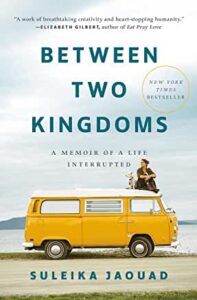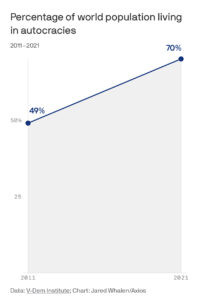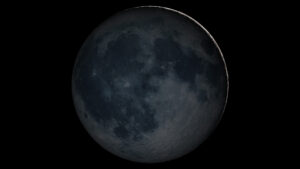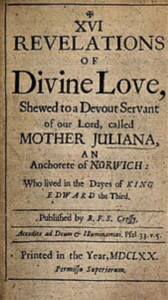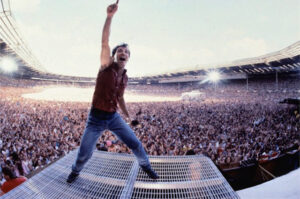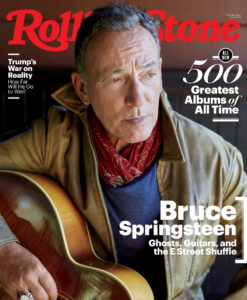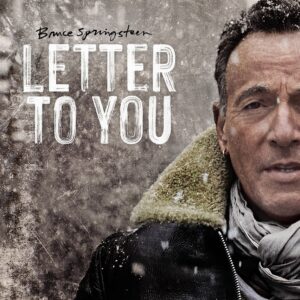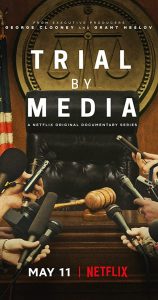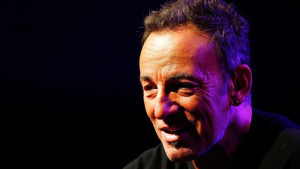Bruce Springsteen
Thursday, March 31, 2022
March 31, 2022’60-65% of all the cells in the heart are neural cells, which function in the same way as brain cells.’
A global shift is under way and more people are sensing it involves a deeper connection with their heart. This desire for more heart connection is a growing movement, one that people are drawn to by a nudge from their own intuition or conscience to listen to their heart more and to connect with their inner guidance. -Heart Math
100 Days of Creativity with Suleika Jaouad begins tomorrow, April 1st
‘Here, as I’m undergoing my second bout of cancer treatment for leukemia, I’ve decided to do a 100-day creativity project beginning on April 1, 2022, and I’m inviting all you beautiful souls to join me.
This is my fourth go-round. To me, the 100-day project is so powerful, both the sense of creative possibility and the organizing principle it affords: your day becomes centered around one small creative act. I also love the element of community, drawing inspiration and a sense of accountability from others.
There are so many shapes such a project can take—from writing a daily childhood memory to collaging, piano playing, or walking in nature. It just needs to feel exciting, a little challenging, but most of all sustainable, so you’re able to keep it up over the course of 100 days.
As someone who feels pulled by the siren call of hyper-productivity, I want to make clear: the 100-day project is not that. The point is to get into a more liberated, playful creative flow state—not to reinforce the pressure of constant striving, or the compulsion to be productive, or the idea that creative activity needs to culminate in some kind of grand masterpiece.
This time around, the 100-day project will be mostly self-directed. For those who want an extra dose of accountability, paid subscribers will have the option of getting regular pep talks from me, along with check-ins and opportunities to have your work featured.
Below you’ll find some frequently asked questions and my answers—all with the caveat that this practice is for you. Make it your own. Let it take you where it will.
In love and creative solidarity,
Suleika’
Her book, Lost Between Two Kingdoms, is now available in paperback. Wonderful read and journey. -dayle
AXIOS
Democracy is good for your health
Here’s a big reason to study the people of Ukraine: The war is showing in real-time the power of democracy, amid growing global clout for dictators.
Why it matters: Free people live better lives, a mountain of data shows. And sometimes it takes an aspiring democracy to remind us why governments of the people are worth fighting for.
Let the graphic above sink in — then share it with people who trivialize democratic erosion. Democracies are literally disappearing.
Of 195 nations on earth, just 34 are liberal democracies — where citizens have rights to free speech, free press, free and fair elections, and other liberties — according to a study by Varieties of Democracy.
Living in a stable democracy leads to a longer and more fulfilling life, the data shows:
Health: If you live in a democracy that’s at least 25 years old, you’re likely to live 14 years longer than people in autocracies, a University of British Columbia study found. Babies in mature democracies are 78% less likely to die in childbirth.
Wealth: Democratization boosts a nation’s wealth 20% over 25 years.
Education: Democratization bumps citizens’ enrollment in secondary education by 70%.
Reality check: After nuclear war, and possibly climate changes, the rise of authoritarians, like Vladimir Putin, and the decline of democracies has the most potential to shape America’s future — more profoundly than the small-ball fights we often get sucked into.
The dictators are winning. A Russian dictator, backed by an authoritarian Chinese leader and enabled by the silence of the Saudis, is killing thousands, seizing land, destroying a nation.
A Freedom House report released in February found that 60 countries had suffered declines in democracy in the previous year.
The bottom line: American critics sometimes dog — and in some cases damage — their democracy. But watching Ukrainians amplifies the preciousness and precariousness of freedom.
[Editor’s note: This article has been corrected to note that people living in democracies older than 25 years are likely to live longer.]
Glory to Ukraine ~ Their struggle, their sacrifice, is ours. -dayle
Julian of Norwich
‘She encourages us to stand up to the forces that destroy, forces she calls “the spirit of evil.”
The warrior in us can rise up, armed with trust and courage, to spread low and make justice and compassion happen. In doing this, a promise is set forth that, some day, all can be well.
“All shall be well, and all shall be well and all manner of thing shall be well.” ❁
-Julian of Norwich
‘The biggest influence on Julian as an adult were Thomas Aquinas and Meister Eckhart, whether directly or indirectly. Remember that Aquinas, who was condemned by bishops in both Oxford and Paris less than a century before Julian was born, was condemned for his non-dualism (which, again, makes him a photo-feminist). But, and this cannot be emphasized enough, he was canonized a saint in 1323, less than twenty years before she was born. The excitement among the Dominicans in England must have been extreme.
As Aquinas put it, one person can do more evil than all the other species put together.’ -Matthew Fox
Yep. Still. The 21st century is no different. -dayle
Power Path
New Moon in Aries is Friday April 1 at 12:24 AM, just after midnight March 31. In some time zones the New Moon is on March 31.
‘This is an extremely potent New Moon, full of fire, opportunity, and inspiration for starting something new. It marks the beginning of a new cycle and should be honored as the set up and foundation for new commitments, goals, confidence, clarity, change and attitude. We are called to action, to be better, to be more conscious and aligned with spirit. It’s a great time to revisit goals and intentions and either reset and confirm them as they are, or refine and improve them if they feel too limited.
A re-evaluation of your relationships especially your relationship to yourself and to spirit is also supported at this time. Are you doing the work? Are you committed to having a good life? Are you taking responsibility for it? Are you ready to embrace the power that awaits you and change all aspects of your story that point to disempowerment or being wronged in some way? This is a very good time to step into power and to do so takes being proactive and not reactive.
You cannot be ambivalent or in blame of others if you wish to be proactive and take advantage of what this time has to offer. Step into the grand adventure of life and receive the gifts of spirit that are available to those that do. Happy Spring. Happy planting of seeds, dreams and wishes.’ ☆
For the Bees
Steady-Newsletter
by Dan Rather, author and journalist
What I find so inspiring about this article and the larger No Mow May movement is its recognition that we humans are foolhardy to try to control nature — that in our homogenization of our landscapes, our search for tidiness and uniformity, we not only miss out on the beautiful wildness of Earth’s diversity, but we also do real damage to its function.
At Steady, we are always on the lookout for different kinds of news stories that inspire, provoke thought, and, yes, induce some hope and steadiness.
We came across just such an article recently in The New York Times. It was written by Anne Readel, who is described as “a photographer, writer, biologist and lawyer.” It’s quite the list of credentials and a reminder that many of us wear multiple professional and personal hats.
During an era of momentous events, this story could be considered “small” or “quaint,” but that scale of size is part of what makes it so powerful. I would argue that in a world that often seems out of balance, we can build progress from small individual actions that are transformative in their collective impact.
The article is titled, “In Wisconsin: Stowing Mowers, Pleasing Bees,” and it asks in its subtitle a question that pretty much explains its central idea: “Can the No Mow May movement help transform the traditional American lawn — a manicured carpet of grass — into something more ecologically beneficial?
‘Appleton became the first city in the United States to adopt No Mow May, with 435 homes registering to take part. For the last few years, Appleton has spearheaded the movement to save the bee by asking community members to leave their lawns alone during May.’
Lastly, on this final day of March 2022, sharing writer Alexandra Stoddard’s words of contemplation for our ‘next’ as democracies weaken, devastating wars continue, the ubiquitous plague waves in and out, and global corruption, i.e., greed, power, and patriarchy, corrodes even the simplest of lives.
When do you feel you are most in touch with your spirit, the core of your being? Where are you? What are you doing? Who are you with? Who would you want to be with? How does this make you feel?
Marianne Williamson:
“We were all indoctrinated into a disenchanted world, and we’ve sacrificed a lot in order to live here. The world isn’t better off for having forfeited its tenderness. The meanness and cynicism of our age, the reflexive sarcasm that passes for intelligent reflection, the suspicion and judgment of everyone and everything – such are toxic by-products of a disenchanted worldview.
Many of us went off that wheel of suffering. We don’t want to accept that what is is what has to be. We want to pierce the veil of illusion that separates us from a world of infinite possibility. We want another kind of life for ourselves and for the world. We are considering that there might be another way – a door to miraculous realms simply waiting to be opened. Today I consider that there might be another way.”
“What you don’t surrender, the world strips away.” -Bruce
4 from Bruce.
May 20, 2021Bruce Springsteen receives the 2021 Woody Guthrie prize. Here’s the full setlist, his homage to Woody.
1) Tom Joad
2) Deportee
3) Across the Border
4) The Ghost of Tom Joad
‘Bruce Springsteen has been awarded the annual Woody Guthrie Prize. He will accept the honor on May 13th during a virtual event for Woody Guthrie Center members. “I’m honored to receive the 2021 Woody Guthrie Prize,” Springsteen said in a statement.’ [Rolling Stone]
“Woody wrote some of the greatest songs about America’s struggle to live up its ideals in convincing fashion,” Springsteen said in a statement.
Whispers.
January 23, 2021“We may stumble, but always there is that Eternal Voice, forever whispering in our ear.”
-Science of Mind, p. 33
Eschatological secret [ultimate destiny of humanity]; wise heart…secret hope. -Thomas Merton
Revelations of Divine Love.
Lady Julian of Norwich.
‘Julian says that we have in us here such a “medley” of good and evil that sometimes we hardly know of others or of ourselves wherein we stand…’
-https://www.gutenberg.org/files/52958/52958-h/52958-h.htm
COVID
25,000,000 U.S. Cases
414,000 + deaths.
From Krista Tippet, Saturday, January 23, 2021
This week’s Pause is written by Krista:
Dear Friends,
I’ve been thinking this week about vocation — from the Latin vocare, callings. Somewhere along the way in this culture a person’s vocation became synonymous with their job title, but I think of vocation as the full range of our callings as human beings. Yes, as professional people but also as family members and neighbors, parents and friends, and members of a body politic. Vocation is not so much about goals and accomplishments. It’s about how we orient our lives and our attention and our passions. At different stages in life, different callings emerge and take primacy — what we focus on and pay homage to with our presence, and what we fight for from the ground of what we love.
To pick up the question of what is calling me and you is one way to begin to walk, each with our own offering, towards a new kind of wholeness in our life together. For there are callings in a time as in a life.
Some of us — many of us — are called right now primarily to get safe and fed and warm, to keep those we love safe and fed and warm. Some of us are called to place our bodies between other bodies and danger. Some of us are called to be bridge people, staking out the vast ground at the heart of our life together where there is meaningful difference but no desire for animosity.
And some of us are called to be calmers of fear. This calling is so tender, and so urgent, if what we truly want is to coax our own best selves, and the best selves of others, into the light. Fear is the primitive, powerful place our brains go when they perceive threat. It collapses imagination, closing down a sense of the possible. It looks for an “other” to blame, and it finds one. The anger that has consumed our life together on every side is fueled by pain and fear.
This is an uncomfortable truth to take in, a fact not about life as we wish it to be but about life as it is. One of the most painful things for me to watch in the frenzy of our life together in recent years was the loss of any capacity to remember that essential contradictions run wild in each of us and are real, too, in whoever our “others” have become. There is a terrible but also a beautiful, and potentially redemptive, complexity at play whenever human beings are involved.
I wonder if now, more of us who are safe enough might feel ourselves called — to invoke Bryan Stevenson — to walk towards the reality that those who confuse and vex us are more than the worst thing we believe they are or have done. We might be called — to invoke an image Frances Kissling once gave me that has shaped my sense of calling ever since — to populate and build up “that crack in the middle where people on both sides absolutely refuse to see each other as evil.” We spend so much time and energy in this culture, so much fierce creativity, wishing to change other people’s minds. But in life as it is lived, we know that’s not how it works. Hearts soften, and then minds open. Pragmatic possibilities appear that our bodies and brains literally could not fathom before.
The show we’re offering up this week is another kind of nod to our complexity — and to how hard a time we continue to inhabit. Even as I write this with passion I feel my body clenching, exhausted by the idea of greater callings. On some level, I’m just trying to get through the days. Katherine May, who I learned about when I asked people on Twitter what was helping them get through their days, reminds me that heeding my clenching and exhaustion is also part of the way forward. She meditatively explores “wintering” as a season of the natural world but also as a place our bodies and psyches need to go, a season that recurs again and again across a life. We cheat and dismiss this in life as we’ve been living it, but it has presented itself insistently in a pandemic year we might reimagine as one long communal wintering.
We can’t move forward without grieving all we’ve lost in the past year. Closer to the ground, this means we have to let in the fact of sadness — a precursor to pain and fear — with some reverence. If happiness is a skill, Katherine May says, so is unhappiness. Winter embodies the strange complexity of reality. It is the bitterest season, we blithely say. And all the while it manages not to be the death of the life cycle, as Katherine May reminds, but its crucible.
Katherine May helps me, and I hope she offers some restorative grace to you.
Krista
Rev. Dr. Barbara Holmes, Center for Action & Contemplation:
…the American dream of freedom and equality could be made real through courageous action in a spirit of love, in pursuit of human dignity for all. This dignity includes all who suffer from homelessness, joblessness, purposelessness, carelessness, hopelessness.
Because our needs are so great today, and your care so constant, we know that you are rebuilding the network of compassion around new visionaries who you have assembled for this hour. Surprise us with the discovery of how much power we have to make a difference in our day:
—A difference in the way citizens meet, greet, respect, and protect the rights of each other.
—A difference in the breadth of our vision of what is possible in humanization, reconciliation, and equalization of results in our great city.
—A difference in the way government, business, and labor can work together, for justice and social enrichment.’
https://www.youtube.com/watch?v=kceBOoQxEA8&feature=youtu.be
Bruce’s community.
January 15, 2021‘The first half of Bruce Springsteen’s autobiography makes some things abundantly clear:
He had no natural ability to play the guitar. In fact, after his first lessons, he quit, unable to play a note.
He had no singing talent. Every group he was part of needed a lead singer, and it wasn’t him.
And just about everyone dismissed him. Audiences walked out, his first agent simply stopped returning his calls and bandmates gave up and moved on.
He didn’t even know how to drive a car. Not only wasn’t he dating in high school, he wasn’t even cruising around town, being a charismatic rock star.
Talent is overrated. Skill is acquirable.
Showing up is something almost every creative leader has in common. In business, in the arts, in society. Consistently shipping the work, despite the world’s reaction, despite the nascent nature of our skill, despite the doubts.
And community is essential. The people you surround yourself with can reinforce your story, raise the bar and egg you on.
After the fact, the community becomes an integral part of your story of success. But first, you have to commit to the journey.’
-Seth Godin, author
“Writing about yourself is a funny business…but in a project like this, the writer has made one promise, to show the reader his mind.”
-Bruce
Can we agree at least on this?
Because, well, it’s Bruce.
October 30, 2020Rolling Stone/By Brian Hiatt
Were it not for the intervention of a once-in-a-century global catastrophe, Springsteen — who turned 71 on September 23rd — would right now be preparing for that world tour with the E Street Band. It was supposed to start, he reveals, in the spring of 2021. Instead, he says, “My antenna tells me, at best, 2022. And I would consider the concert industry lucky if it happens then.… I’m going to consider myself lucky if I lose just a year of touring life. Once you hit 70, there’s a finite amount of tours and a finite amount of years that you have. And so you lose one or two, that’s not so great. Particularly because I feel the band is capable of playing at the very, very, very top, or better than, of its game right now. And I feel as vital as I’ve ever felt in my life.… It’s not being able to do something that is a fundamental life force, something I’ve lived for since I was 16 years old.”
It’s excellent. -dayle
“It’s the only album where it’s the entire band playing at one time,” says Springsteen, “with all the vocals and everything completely live.” (A few of Springsteen’s twangy guitar leads, played on a Gretsch, are among the only exceptions.)
“It was really like the old days,” says drummer Max Weinberg. “Just pure musical energy, with the hard-earned musical and professional wisdom of guys in their 70s, or close to 70.” It also happens to be the most classically, unabashedly E Street-sounding album since at least The River. It’s a late-period rebirth of sorts, and it started with thoughts of death.
Bruce: “You count the names of the missing as you count off time. Their spirit, their energy, their echo continues to resonate in the physical world.… A beautiful part of living is what we’re left by the dead.”
I’ll see the houses I lived in as a child. I’ll walk through their halls. We see all those folks in our dreams until we become a dream ourselves.
“We miss them dearly, but they’re standing right next to us.”
Brush with Bruce. Ketchum, Idaho…Chapter One. Turned my head to catch my breath. We had a brief exchange. It was a moment. And indelible.
♥ you, Bruce.
-dayle
Trial by Media
May 16, 2020Netflix docuseries.
Executive producers:
- George Clooney
- Court TV creator Steven Brill
- CNN legal analyst Jeffrey Toobin
The Guardian:
“We wanted a mix of cases that were famous and recognizable, and cases that were … just bizarre and fascinating on their own terms,” Toobin, a New Yorker staff writer, told the Guardian. “It’s really more about media manipulation from a broader perspective. I think in each of these stories, you see that the one-sentence media summary is almost invariably misleading if not outright wrong” compared with the trial.”
Episode #3:
The death of Amadou Diallo, an unarmed west African immigrant who was shot at, in what became an incendiary headline, 41 times by New York police in the vestibule of his Bronx apartment” while reaching for his wallet. He was unarmed. The four NYPD white police officers were acquitted after the trial was moved from the Bronx to Albany.
“The one thing you can say with certainty is that courtrooms are not hermetically sealed from what’s going on in the world,” said Toobin. “That tension between wanting a verdict entirely on the evidence in the individual case and recognizing that politics and social conditions are always going to affect the outcome – that is I think part of the tension that’s always going to be present in courtrooms.”
“You can get killed just for living in your American skin.”
Because. It’s Bruce.
September 5, 2016One of his most powerful contributions to social commentary.

